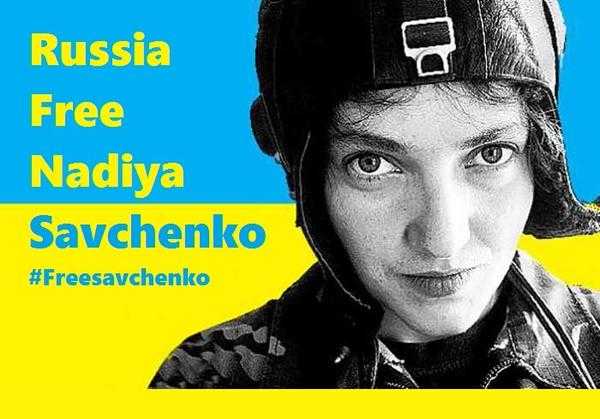Sentence for Nadia Savchenko will be tough

Donetsk city court of the Rostov region decided to postpone the final word Ukrainian pilots Hope Savchenko on March 9. At the same time it will be announced and the date of the announcement of the verdict. In response to Savchenko, which was supposed to come up with the last word on March 3 announced that from March 4, begins hunger strike. Sentence for Savchenko, which insists the prosecutor’s office – 23 years in a general regime colony and a fine of 100 thousand rubles.
On peculiarities of the case Hope Savchenko and possibilities of further development of DW spoke with a member of the Moscow Helsinki Group, a leader of the movement “For Human Rights” Lvom Ponomarevym.
Deutsche Welle: Case Hope Savchenko, of course, stands out among the other criminal cases with political overtones that have been or are being considered in Russia. How would you describe it? What are the characteristics of this business?
Lev Ponomaryov: Here you can talk about the peculiarities of the socio-political and technical. As for technical features, it looks very strange that this resonance process was conducted in a small town in the Rostov region. It is quite clear that it is of great interest from the media and the Russian public. Therefore, this process is tucked in a small town, the power went head-way to being able to discuss it and media coverage. When we see that the Russian authorities in this head-on way to address these issues, it is clear that the sentence Savchenko is likely to be tough.
If we talk about the impact on society, then, unfortunately, this effect we have to a large extent has a TV, which has long been prepared Russian citizens to the fact that the fate of Savchenko previously resolved and that she is guilty. No additional arguments will not work here. For example, the process itself was conducted biased. Of course, there are still 15 percent of Russians who have their own point of view on what is happening in the country, and the annexation of the Crimea and events in eastern Ukraine. And on the part of these people can be seen compassion for Hope. For example, in Moscow, activists came to congratulate her birthday, picket, law enforcement officers detained them for it. That part of the society that understands that Russia committed aggression in Ukraine, sympathizes with Savchenko and hopes that in the end it still exchanged.
– Has anything changed or an appeal in the case of a guilty verdict?
– I do not think. In such a politicized process appellate court did not play a big role. In this I have no doubt. I believe that the yield can be exchanged. I think it’s absolutely real. In the Soviet era, for example, exchanges have occurred regularly. My friend, a human rights activist Yuri Orlov, the founder of the Moscow Helsinki Group, was exchanged for some Soviet spy (In 1986, Soviet dissident Yuri Orlov was expelled from the Soviet Union in exchange for the arrested in the US Russian spy Gennadiy Zakharov ) . Exchange practice is widely used.
– But the Savchenko categorically opposed to it exchanged for detainees to special forces troops GRU Ukraine Alexander Alexandrov Evgeny Erofeev. You personally would welcome such an exchange?
– Yes, of course, I would only welcome such a decision.
– One of the lawyers Savchenko, Ilya Novikov says: to free her, world leaders should push himself to President Vladimir Putin. Do you believe that in this way you can influence the outcome of this case?
– Yes I believe you. I am sure that it is private pressure on Putin is essential in this case. Putin – authoritarian leader. If you ask him personally, for example, Barack Obama, it is, in my opinion, would be willing to do this kind of gift, so to speak.
– How would you describe the current state of justice in Russia? Where it moves?
– a difficult question, because there are new categories of cases, which did not exist before. There are new political prisoners, and their number increases. If earlier political prisoners in Russia had several dozen, but now they have much more than a hundred.
If we talk in general about justice as such, the acquittals in criminal cases – less than one percent. Their proportion is from 0.3 to 0.5 percent, while the democratic world around it varies in the range from 10 to 20 percent. And that’s OK, because there is the concept of presumption of innocence.
That is, people in Russia to justify 50 times less than in the rest of the world. Imagine how it is unfair trial. Moreover, even in Stalin’s time it was more acquittals. This suggests that in Russia a judicial crisis – the judicial system, we are in a catastrophic state.
– And what do you associate the growing number of political prisoners and political affairs?
– Due to the fact that the regime is becoming weaker. People who are in power in Russia, realize that sooner or later they will have to leave. They seem to want to be replaced by those who would guarantee them that they will not be persecuted. And it needs to come to power the followers of the current government, not the new political forces. And not to be replaced by new political forces, they need to be intimidated and do not give the possibility to repeat in Russia a peaceful democratic revolution that has already taken place here in the early 90s.
Interviewed by Maxim Sidorzhevsky.
Sourse, 03/03/2016

